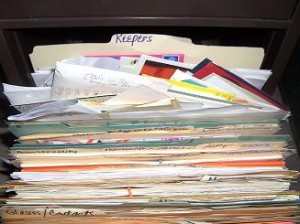Tucked into the “K” section of our file cabinet is a manila folder marked “Keepers”. It’s bulging with over 100 notes, cards and letters written by our children. The run-of-the-mill thank you notes or greeting cards that came with just a signature are not included. The Keepers file is reserved for words that are too cute, too powerful, too moving to part with.

Some are written in the labored printing of a first grader:
“I like you and your fammlee. I like whiut you duw for me. I like my klos I wier. I like my fowd. I like you.”
Others contain the scrawl of a teenage son: “I tried to write a poem, but it wasn’t going well. So I decided I would just tell you how much you have helped me through the years. I could never repay you, but I’ll still try!”
Then there is the swirly script of a middle school daughter: “Is there any possible way I could sleep in today? Please?!?! I didn’t get to lay down in my bed until exactly 1:25 and 30 seconds! My stomach hurts and I have a headache and I can’t see strait because everything wobbles and my eyes are watering.”
In a store-bought Mother’s Day card, one high school son simply wrote: “Thank you for having me.” And a fifth grade daughter, struggling with creativity, wrote: “Mom and Papa, you bring us love. Two wonderful parents sent from above. We’ll never push, we’ll never shove. We’ll give you are hearts which are happiness full of.”
Another note contains a song entitled “Mom” complete with hand-written score and large piano notes, composed by an eleven year old. Several cards are accompanied by short stories and two by full-blown picture books. One offered a coupon for free babysitting of a little sister.
From a 14 year old son we read: “I have some bad news. An almost full 32 oz bottle of water hit your car trunk and dented it. I will pay.”
Several letters included heart-felt apologies, this one from a nine year old: “I can live without a Barbi, and I can wait a few years to learn the flute. I’m sorry I complain alot. Please forgive me for it. I love you! XOXO.”
As the kids grew older, their letters contained more serious messages. From a new college grad we heard, “I used to be really focused on creating a fun life for myself. I believed in God, but I used to think if I gave everything over to him, my life wouldn’t be as good, like I needed to hang onto some areas or I wouldn’t get what I wanted. The funny part is, letting go is the only way you ever feel peaceful.”
One of our twenty-somethings wrote: “You’ve demonstrated what it means to weather the storm and consistently live by the principles you believe. That’s uncommon today. Thanks for being role models and commitment-keepers. Everyone notices.”
And a thirty-something wrote: “Thanks for all the support you give all your children. It must be hard doing all the prayer work and seeing fruit only some of the time. We may not always say so, but thank you.”
Why do we keep these? It’s because they’re a written record of family love, each one a treasure. And if the house was burning down, it’s the Keepers file I’d grab.

 the game. Mom always laughed the hardest.
the game. Mom always laughed the hardest.